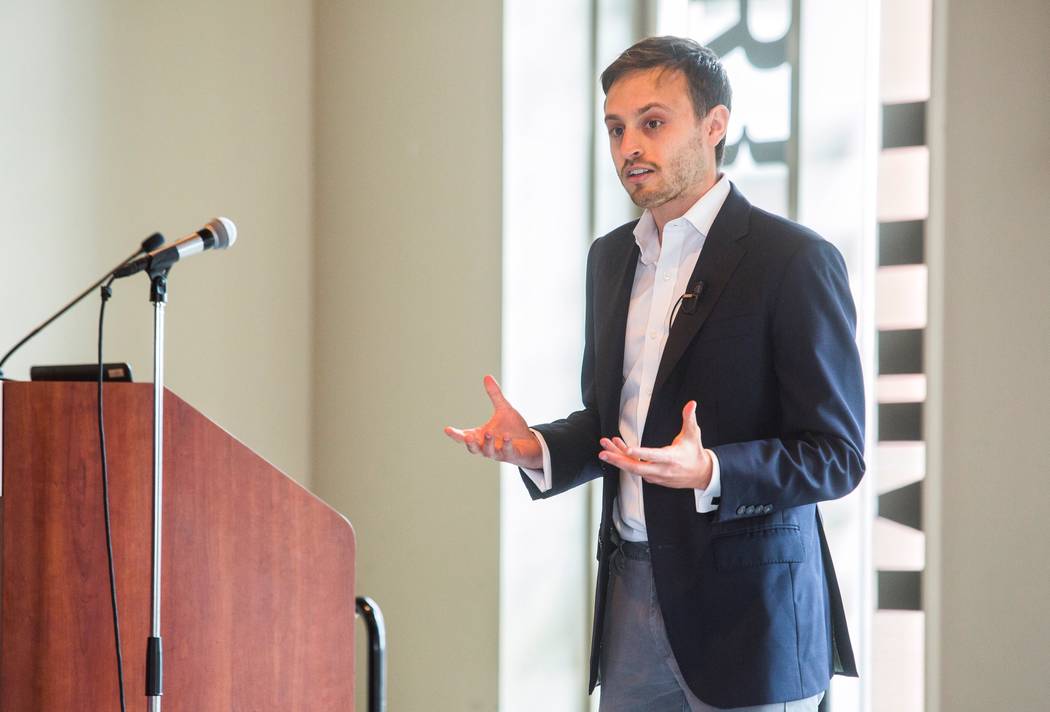College finance app targets Nevada, New York


Nevada State College may become one of the first higher education institutions to partner with a new app that seeks to prevent students from dropping out for financial reasons.
David Helene, founder of Edquity, said Nevada State College is slated to begin using the technology in January. Nevada State College officials could not be reached for comment Friday.
Edquity, which describes itself as a “one-stop shop” for college-related finance, was among 100 new financial technology companies chosen by Money 20/20 for its USA Startup Academy this week. Money 20/20 is the largest annual show in the U.S. dedicated to payments and financial technology, attracting more than 11,500 industry professionals. The four-day show closed Wednesday.
The intersection of technology and financial services is reshaping the way people pay, save, invest, buy insurance and manage their overall finances — including planning for college tuition.
Edquity offers high-school and college students — and their families — a financial management tool to prepare for their higher education costs and then monitors spending. It sends push notifications if a student is in danger of dropping out on financial grounds.
About 3 million students drop out of college for financial reasons, according to a report published last month by Reos Partners. As many as a third of students don’t have $500 to cover an emergency, the report said. Some higher institutions have emergency aid, but students are often unaware of it.
Dropouts are in a tough position, said Greg McBride, chief financial analyst at Bankrate.
They are stuck with the college debt but without a degree. Thus doors to a solid job and wage that will enable them to pay down the debt are often closed, he said.
Higher education institutions often miscalculate by as much as 20 percent the true cost of attending college, including housing and food allowances, according to research by the Wisconsin HOPE Lab.
Edquity would be in a position to help higher education institutions better forecast annual costs as they gather data on student spending habits, Helene said. Colleges could then offer a more accurate financial aid that won’t leave students suddenly scrabbling for additional funds, Helene said.
Students “are ill equipped not only with the knowledge but the skill set to engage with very opaque information to make an informed choice and persist.”
Edquity also helps students fill out federal financial aid forms and demystify their college aid packages. There is no federal standard for how colleges and universities should report their financial aid packages to students, he said. The result is that they are often “opaque and meaningless” to students, Helene said.
“We help them translate what they receive so that they can understand their aid package. Then we tie that back to the budget that they’ve created so that they have a clear picture of what their outflows need to be, what’s covered and what the gaps are,” he said.
The average U.S. college student has a little more than $30,000 in debt upon completing their undergraduate degree, according to Bankrate.
Edquity is free for high school and college students enrolled at institutions that partner with the company. It can be used by all students for a monthly subscription fee. However, Helene said the tool will be free for families with income of less than $50,000 a year.
The company currently has contracts with several high schools and two colleges, including Nevada State College and LaGuardia Community College in New York, Helene said.
Through the partnership with Nevada State College, Edquity will incorporate all the resources the college offers, such as emergency financial aid, food pantries, child care, and transportation services into the student financial management tool.
Hundreds of companies like Ellevest, Credit Karma and Edquity are harnessing the latest developments in technology including artificial intelligence, to educate consumers and offer better, faster or cheaper financial service products. However, not all startups will make it. The environment for providing financial services is only growing more competitive.
Helene set up the New York-based company in 2016 after helping high schools build their own 10-year financial plan.
Contact Todd Prince at 702-383-0386 or tprince@reviewjournal.com. Follow @toddprincetv on Twitter.













